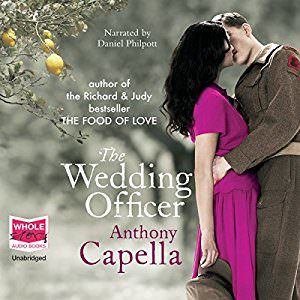 Narrated by Daniel Philpott
Narrated by Daniel Philpott
Anthony Capella’s The Wedding Officer is an enjoyable and engrossing tale set in wartime Italy, which is told through the eyes of a fish-out-of-water young British officer and the fiery Italian widow with whom he falls in love.
Naples in 1944 is now occupied by the allies, and things aren’t all that much better than they were under the Germans. Food is scarce and people are struggling to survive; there’s a thriving black market on which one can obtain just about anything, and most of the women in the town are forced to prostitute themselves in order to keep body and soul together.
This last thing is regarded by the army as the biggest problem of all; venereal disease is rife and supplies of valuable penicillin are frequently stolen (and then resurface on the black market and have to be re-purchased!) but there are also increasing numbers of British soldiers applying for permission to marry Italian women, most of whom the army big-wigs label as prostitutes and therefore regard as not the sort of women they want accompanying their husbands back to England after the war. Captain James Gould is sent to Naples and given the job of interviewing the would-be brides and is horrified at the lax attitude of his predecessor, who seems only too happy to dine out at restaurants supplied by the black market and to turn a blind eye to many of the less than legal activities going on around him. James immediately determines to clamp down and stamp out as much of the corruption as he can, so when the townsfolk realise that he is not open to bribes and is going to play by the rules, they decide something needs to be done. While James’ intentions are good, he is making already difficult lives even harder, and in an attempt to loosen him up, the town leaders concoct a scheme whereby he engages Signora Livia Pertini as his cook; not only is she a beautiful woman, she’s an incredible cook and a stomach regularly full of wonderful food is sure to have the desired effect.
“A man can be sleeping with the most beautiful woman in the world, but when he gets up from her bed he’s still exactly the same person he was before. But a man who has eaten well – he’s at peace with the world, he’s happy, and more importantly, he wants other people to be happy.”
Livia comes from a small town in the shadow of Mount Vesuvius, and learned to cook pretty much as she learned to walk. She worked in her father’s small restaurant before she met and married a young Italian soldier and moved to the city to live with his family, but when the family home is bombed she moves back to live with her father and sister for a while. Times are incredibly hard, so when she is offered the chance to support herself by moving to Naples to cook for the officers there, she takes it.
It’s not long before Livia’s sumptuous cooking starts to distract James from his hard-line attitude, but it would be wrong to say that his change of heart is down solely to Livia’s culinary skills. He has also begun to understand the stark reality of people’s lives and to see that not everything is as black and white as he had believed it to be. He’s drawn to Livia’s intelligence and spirit and as he starts to fall in love with her, can’t help but see the irony of the fact of “The Wedding Officer”, wanting to marry an Italian girl himself.
The story is a very well written variation on the “local meets uptight interloper” trope and is divided into four parts, with the last being the most sombre and chilling. It’s obvious that Anthony Capella has thoroughly researched the historical background and knows a lot about Italian food and cooking! – and the book is written with an incredibly light touch and a lot of wry and engaging humour. But this is wartime, and there are moments of horror and heartbreak, too, and both sides perpetrate acts of atrocity which left me reeling. The central characters are nicely rounded-out and three-dimensional, and the author’s descriptions of the dishes Livia cooks are absolutely mouth-watering.
The Wedding Officer is a terrific blend of historical fiction, romance and food-porn (!) and I enjoyed it very much, although the last section – which sees James and Livia torn apart thanks to the machinations of the novel’s baddie, a local big-wig with (implied) Mafia connections – is perhaps a little too melodramatic for my taste. That said, it’s undeniably a good bit of storytelling and certainly serves to ramp up the tension as we head for the finale.
I’ve only listened to Daniel Philpott once or twice before, but his name as narrator on this book was enough to interest me in listening to it. I loved his performance in Georgette Heyer’s The Unknown Ajax, and his narration here is excellent on every level. James is clear-voiced and sounds exactly like the naïve, fresh-faced young officer he is, and Mr. Philpott adopts and sustains a lilting, Italianate accent for Livia throughout, and is equally adept at portraying the other Italians in the story – Livia’s father, the canny Angelo, the sleazebag Alberto and the various other supporting players who drift in and out. He does a great job differentiating between James and the various British officers, and while his American accent is a bit dodgy, he carries it off fairly well in his portrayals of James’ colleague, Eric and the few other American soldiers who appear in the story.
If you enjoy romantic historical fiction, then I’m sure The Wedding Officer will appeal, although if you’re looking for something in which the romance predominates (James and Livia don’t actually meet until almost half-way through), this might not be the book for you. But at the time I picked it up, I’d wanted to listen to something a bit different to my usual fare and it didn’t disappoint.
Note: This title is available for download only from Audible UK. There is an abridged version available in Australia (with Richard E. Grant narrating). The link is to a used audio cd at Amazon.com (1 copy available).
Caz




1 thought on “The Wedding Officer by Anthony Capella”
Comments are closed.